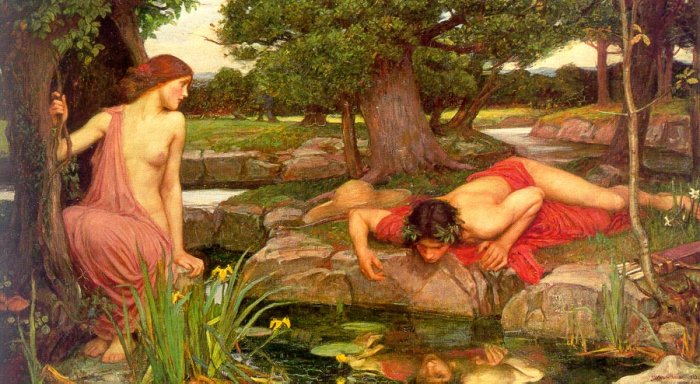 Our story begins with Echo and Zeus. That ever-cheatin' God was at it again, this time with the mountain nymphs of Kithairon, of whom Echo was one. Now, at that time (just in case you may have picked up on the significance of her name) Echo was a nymph like any other and a very talkative one at that. And while Zeus was dilly-dallying with Echo's sisters, Hera was NOT a happy camper. She had followed Zeus, expecting JUST that kind of behavior out of him. She came down to Earth to apprehend her "too-much-love-for-one-woman" husband, but Zeus, being godly, sensed her coming. Echo bit the bullet and tried to keep Hera busy until he and the other nymphs could get away. Now, Rhea (Hera's mom) didn't raise no fool. She knew she had been tricked, and by a nymph at that! She turned on Echo and declared: Ovid, Metamorphoses 3.365 From that moment on the talkative Echo could barely use her voice, and could only repeat the words that those around her said. She was lonely, and couldn't really talk to other nymphs because of her condition, and secluded herself deep in the woods. 
One day, a very handsome young man came along. His name, surprise surprise, was Narcissus. Echo fell in love with him at once. Echo wanted to call out, "Wait! I love you!" But her voice was frozen in her throat by Hera's curse. The young man went deeper and deeper into the forest, until he came upon a calm stream. He was thirsty and so he bent over to drink, but as he leaned over he caught sight of his reflection in the water. He was as taken by his beauty as Echo had been, but without her barrier. He immediatly spoke to his reflection, "I love you." Echo, nearby and hearing her chance quickly responded, "love you . . ." But it was too late, Narcissus was too engrossed with himself to notice the nymph. His love was his obsession and would not leave the stream to eat, nor disturb his image to drink and so he died of thirst and hunger and unrequited self-love. Where he had lain a flower grew, the narcissus, the same flower that wooed the innocent Persephone. Poor Echo pined away and died for the same things, but when she died not even her bones remained, some say they were turned to stone. But Gaia preserved Echo's voice, the one thing she had been denied in life, and to this day her voice sounds everywhere. Another story of Echo excludes Narcissus altogether. In this version she was educated by Nymphs and taught music by the Muses. She fled from all men, and loved her virginity. Pan became angry with her and attacked her music because he couldn't touch her beauty. He made the goatherds and shepherds insane and they ripped poor Echo apart and flung her pieces across the Earth. But Gaia buried them and preserved their beauty and the Muses decreed that they would forever sing out, imitating all things. You wanna read more? If you like fantasy ("dreams-morphing-into-nightmare dark fantasy") then you should check out Mark Siegel's book, Echo and Narcissus, a modern rendition of the old myth. I haven't read it - but it looks interesting. Check it out! Within thy airy shell By slow Meander's margent green, And in the violet-embroidered vale Where the lovelorn nightingale Nightly to thee her sad song mourneth well: Canst thou not tell me of a gentle pair That likest thy Narcissus are?' John Milton (1608-1674), 'Comus'
Home |
Blog |
Famous Ones |
Goddesses |
Humans |
Nymphs |
Monstresses |
Myth Pages |
Amazons |
Men |
Gallery |
Search |
References
Contact me at ailiathena@yahoo.com |